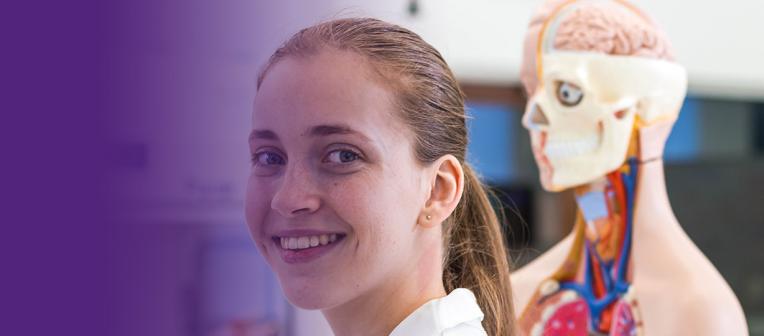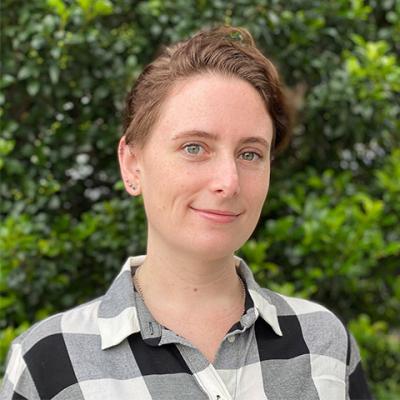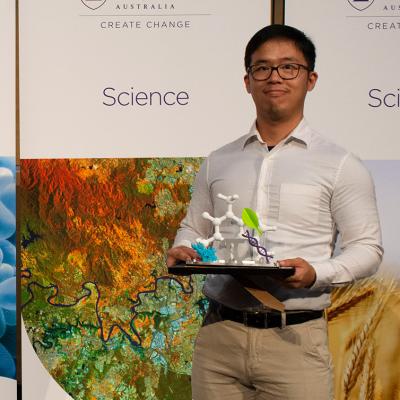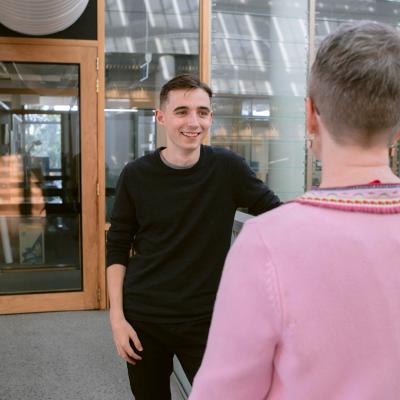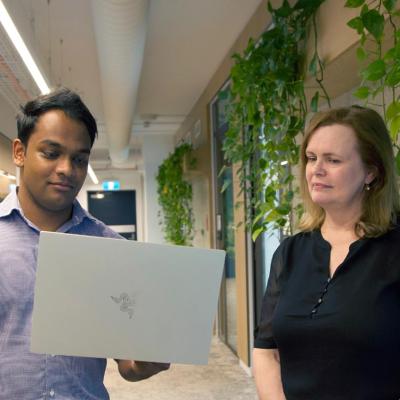What careers can biomedical science lead to? You could find yourself working in a diverse range of jobs and fields after completing a biomed degree at UQ.
Just ask Chris Pymble, who runs her own science communication company. Or ask Harrison Gray, who shapes change for his clients at a global technology and solutions consultancy.
So, what can biomedical science lead to for you? And why choose biomedical science at UQ?
Well, to help answer those questions, Chris and Harrison have shared their stories to highlight:
- the many unexpected avenues a biomedical science program took them down
- how their learnings have helped them succeed in their careers
- what they loved about studying biomedical science at UQ.
Where biomedical science took Chris
Since graduating from the Bachelor of Science (Honours) program, where she specialised in biomedical science, Chris Pymble has since gone on to become the founder and CEO of her own business, Graphics et al.
Having been exposed to a broad range of disciplines throughout her studies at UQ, Chris passion for scientific communication was ignited. This inspired her to kickstart a career she would never have explored otherwise.
“Throughout the course of my biomedical studies, particularly in honours, I came to appreciate the importance of accurate science communication,” she says.
“Following this passion led to my current career, because I was shown the professional standard to which researchers and educators are expected to present their learning materials, and I saw an opportunity to provide high-quality resources to meet those standards.”
Graphics et al. is a tool that helps science, technology, engineering and mathematics (STEM) students, educators and professionals easily create their own visual aids for use in research papers, funding proposals, educational forums, and essays.

“It can be hard in STEM fields to accurately and effectively communicate complex ideas, and this is often due to the fact that visual aids in the form of diagrams and illustrations are difficult and time-consuming to create,” says Chris.
“The idea then came to me to provide support to people on all levels in STEM fields through an easy-to-use platform that saves them time and improves their ability to communicate their research.”
Is biomedical science worth it?
Having forged out a successful career of her own, thanks to the knowledge and skills gained from the biomedical science program, Chris fondly reflects on her time studying at UQ.
The first-rate facilities available throughout the program, as well as the many opportunities to explore topics outside of her comfort zone, made completing the Bachelor of Science (Honours) program, specialising in biomedical science, a life-changing experience for Chris.
“My honours year at UQ was one of the most empowering experiences of my life, where I was encouraged to explore my project and follow my curiosity, while being supported by supervisors with an incredible amount of knowledge and experience,” she says.
“I always felt as though I could approach lecturers with deeper questions on the content that interested me, and, looking back, I can say that I would absolutely recommend this program.”
Where biomedical science took Harrison
Harrison Gray also completed the Bachelor of Science (Honours), specialising in biomedical science, and is now a consultant at global professional services company Accenture.
In his current role, Harrison works with clients from all kinds of industries to drive transformation and sustainable growth using insights from data and artificial intelligence.
“Within Accenture’s strategy and consulting practice, I form part of the technology strategy and advisory function, which strives to shape and drive the technology vision of our clients,” he says.
“Currently, I’m working with a large, multinational resources company as project management lead, which involves working with many different stakeholders and communicating many technical and complex ideas and solutions to a variety of teams.”
Harrison credits the interdisciplinary nature of the Bachelor of Science (Honours) program with preparing him with the skills and confidence to excel in his role.
“This program prepared me for my current career, as it taught me about the value of communication, analytics and a whole range of things that I realise now are so important for carving out a meaningful career in any science role,” he says.
“Studying science will also give you a strong first principles approach to problem-solving, where you gain the confidence to challenge and question any assumptions put before you, in search of a more suitable and affective solution. This has helped me a lot in my current role, where problem-solving and working within teams is so important.”
“Due to the increasing novelties of a connected, digital world, possessing unbiased problem-solving skills appears to be a unique strength of STEM and, in particular, science graduates.”
Having established himself in a valuable role within one of the world’s largest companies, Harrison highly recommends studying biomedical science at UQ to students considering a career in the growing industry.
“The optional honours year at the end of my science degree was my most formative year in terms of personal and professional development and taught me how to research, analyse and communicate complex subject matter to a range of audiences,” he says.
“Another highlight of the program was the regular journal clubs that promote knowledge sharing in a relaxed environment. I highly recommend both the core program and honours component.”
Why study biomedical science at UQ?
UQ is ranked #1 in Queensland for its life sciences and medicine programs, meaning you’ll be perfectly placed to kickstart a career in biomedical science if you enrol in one of the programs we have available.
How should I study biomedical science?
Looking for more career inspiration? Discover careers in science and medicine.

